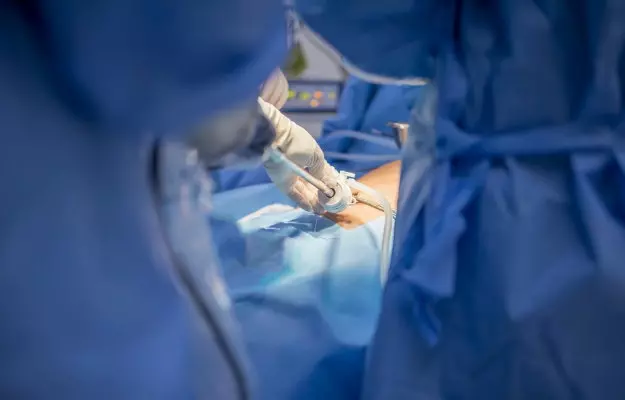On the day of the surgery, a final checkup is done by the surgeon's team. A written and signed consent of the surgery and its associated complications are taken from the patient and the relatives. the patient is then shifted into a major operating room.
The patient is asked to lie on his back on the operating table. A cannula is placed into the arm for administering medications during the surgery. A monitor is attached to track the vitals (heart rate, blood pressure and oxygen saturation). The anesthesiologist will then administer general anaesthesia.
Once the anaesthesia takes effect, the surgery team will prepare the site for the surgery by cleaning it and placing sterile surgical drapes over the body. Thereafter, the surgeon will carry out surgery, for which any of the following two approaches may be used:
1. Open cystectomy
Incisions are made in the lower abdomen. The underlying tissue and muscles are separated. The surrounding lymph nodes are removed and also checked for cancer.
- In the case of partial cystectomy, the part of the bladder that contains cancer along with surrounding healthy tissue is removed, followed by stitching the bladder to close it.
- In the case of radical cystectomy, the blood vessels supplying the bladder are tied and cut. Thereafter, the bladder is separated from the ureters, the urethra and other surrounding tissues and removed. In men, the prostate, seminal vesicles and vas deferens are also removed, while in women the uterus along with fallopian tubes and ovaries, along with some part of the vagina if required are removed.
2. Laparoscopic Cystectomy
This is minimally invasive. In this approach, a small incision will be made below the belly button and a cannula will be inserted. Through this, the abdomen is filled with carbon dioxide to create a working space for the surgeon. Further incisions will be made to allow the insertion of necessary instruments for carrying out the surgery.
Using a laparoscope to visualise along with the instruments, the bladder (or part thereof, in case of partial cystectomy) will be removed along with surrounding organs along with neighbouring lymph nodes. Laparoscopic surgery has also witnessed the use of robots to achieve precision.
Reconstruction
When radical cystectomy is performed, a passage is required to be constructed for urine to flow out from the body. For this, the surgeon may utilise any of the following three methods, depending on patient preference, the extent of the disease, the person’s anatomy and medical status (kidney function, age, overall health):
- Orthotopic neobladder: Out of a part of the intestine, usually the ileum (the last part of the small intestine), a sphere-shaped reservoir is created, which is placed inside the body and attached to the urethra. Functionally, the neobladder cannot completely replace the old bladder but can be emptied through regular catheterisation or by increasing the abdominal pressure. Over time, the catheter may not be required.
- Ileal Conduit: Using the ileum, a tube is created which is attached to the ureters through an opening in the abdomen (stoma). Thus, the urine produced by the kidneys will pass through the ureters into the ileal conduit and out of the body through the stoma. For collecting the urine, the ileal conduit is attached to a pouch (urostomy bag) worn on the abdomen.
- Continent cutaneous urinary reservoir: Using sections of the intestine, a small internal pouch is created to hold the urine, which is drained via the stoma using a catheter. Thus, there is no need to wear an external bag.
Upon completion of the surgery, the incisions are closed using stitches or staples and a drain is left in the abdomen as an outlet for blood and fluid. The entire surgery takes 4 to 6 hours depending on the technique involved.










































